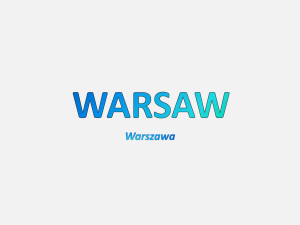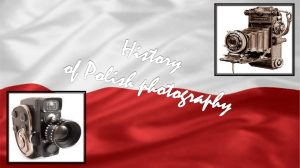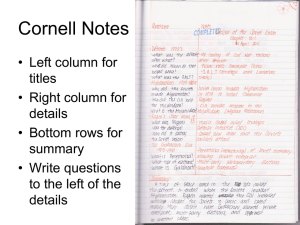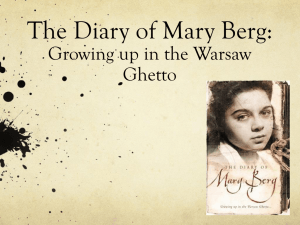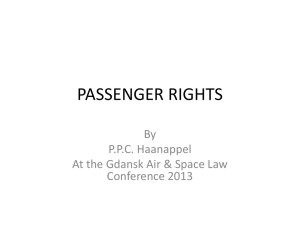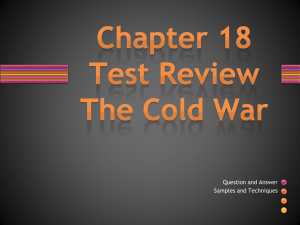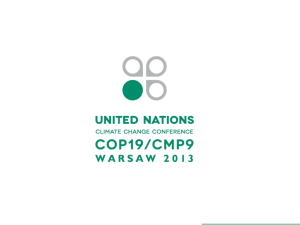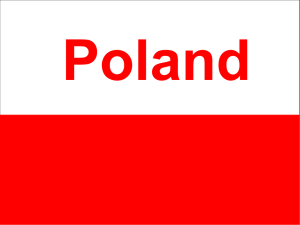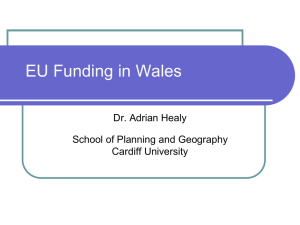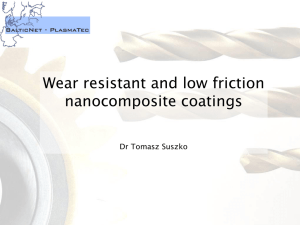renewable energy sources and cogeneration
advertisement
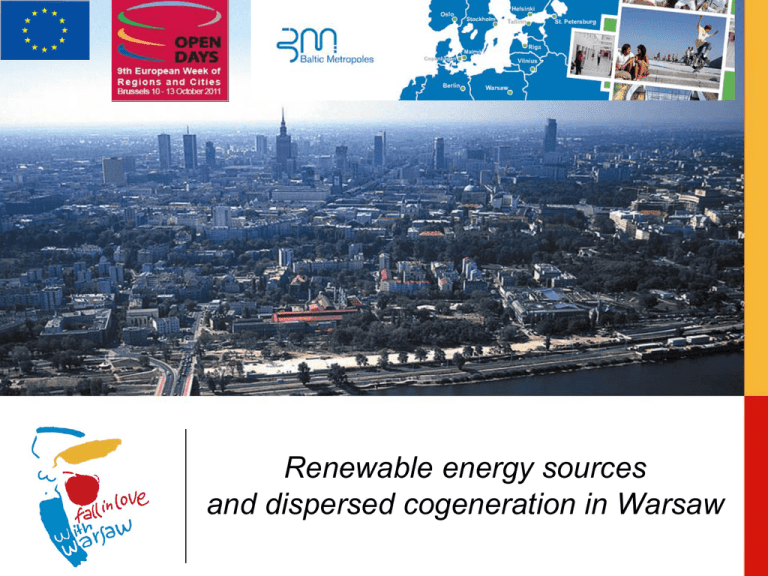
Renewable energy sources and dispersed cogeneration in Warsaw General information Project applies for co-financing from the ERDF within the Activity 4.3. Air protection, energetics of the Regional Operational Programme for Mazovian Voivodship 20072013 Project was top-ranked after the feasibility, strategic and substantive assessment on the projects’ list, issued by the Managing Authority Projects’ budget Total value: Co-financing (ERDF): Co-financing percentage: 9 894 000 PLN 6 925 800 PLN 70% Partners Mazovian Energetic Agency Gynaecology and Obstetrics Hospital in Warsaw City of Warsaw – the leader of the project Subject Implementing the RES (solar and geothermal energy) and utilizing cogeneration in the selected objects in Warsaw 2 school buildings in the Śródmieście (Downtown) District – installation of the solar collectors and heat pumps 1 school and 1 nursery building in the Białołęka District – installation of the solar collectors Cogeneration in the Gynaecology and Obstetrics Hospital in Warsaw Duration July 2007 – June 2013 • 4 investments completed • cogeneration in the hospital – planned for 2012-2013 Main objective increased use of energy from renewable sources and produced in cogeneration in public buildings of Warsaw to help to enhance their energy efficiency and creation of environmentally friendly infrastructure The specific objectives • reduction of emissions, including mainly carbon dioxide, into the atmosphere • diversification of energy sources • increasing of the energy efficiency of public buildings • increased use of renewable energy sources, including solar and biothermal energy • reducing the cost of heat and electricity • increasing energy savings in buildings • improvement of the technical infrastructure of buildings Cogeneration = energy saving Trigeneration technological system for the hospital Trigeneration: a combination of thermal and mechanical/electrical technology combined with the cold production, designed to reduce the amount and cost of primary energy, necessary to produce each of these forms of energy separately In heating systems, in the summer, it improves economic efficiency of electricity production, combined with the heat along with the low demand of the heat and existing demand for the cold Cogeneration = energy saving • Combined energy production reduces fuel consumption by up to 30-50% compared with a split electricity and heat production Complementarity of the project to the international projects • Cities on Power • OPEN HOUSE General information International project financed within the Central Europe Programme Partners form 4 countries: Poland, Austria, Germany and Italy City of Warsaw – project leader This project is implemented through the CENTRAL EUROPE Programme co-financed by the ERDF Partners Local and regional self-government: City of Warsaw (Warsaw City Hall) (project leader) City of Klagenfurt (Austria) Province of Ravenna (Italy) Province Turin (Italy) Expert institutions: Energy Conservation Foundation (Poland) Ecopower Stock Exchange Salzburg (Austria) Research Studios Austria (Austria) Local Agenda 21 for Dresden (Germany) Environment Park Turin (Italy). This project is implemented through the CENTRAL EUROPE Programme co-financed by the ERDF Duration July 2011 – June 2014 Budget 2.335.020 EUR ERDF co-financing: 78,49% This project is implemented through the CENTRAL EUROPE Programme co-financed by the ERDF Main assumptions preparation of policies and strategies aimed at increasing renewable energy use in urban areas a framework to encourage investment in renewable energy in these areas This project is implemented through the CENTRAL EUROPE Programme co-financed by the ERDF The specific objetives Preparation and approval of Local Action Plans for renewable energy, cities Klagenfurt and Warsaw, regions of Ravenna and Turin Developing a common methodology for the analysis of renewable energy resources (solar and geothermal energy) and carrying out this analysis The introduction of incentives to invest in renewable energy in urban areas, by developing innovative financial and organizational tools Investigating the possibility of using renewable energy in selected locations (public buildings) Preparation of investment documentation (studies, tender documentation) regarding the implementation of RES installations in selected locations General information OPEN HOUSE - Standardization and dissemination of methodology of assessing buildings’ sustainability in the European Union on the basis of transparency and openness of the project for implementation Internation project implemented within the Seventh Framework Programme • 19 partners from 11 countries Partners ACCIONA INFRAESTRUCTURAS, S.A. (Spain - leader) CAE Services GEIE (Belgium) APPLIED INDUSTRIAL TECHNOLOGIES LTD (Greece) OVE ARUP & PARTNERS INTERNATIONAL LIMITED (UK) EUSKO JAURLARITZA-GOBIERNO VASCO (Spain) BOUYGUES CONSTRUCTION (France) SLOVENSKI GRADBENI GROZD, GOSPODARSKO INTERESNO ZDRUZENJE (Slovenia) D’APPOLONIA SPA (Italy) Deutsche Gesellschaft fuer Nachhaltiges Bauen (Germany) Eidgenössische Technische Hochschule Zürich (Switzerland) Partners ELECTRICITE DE FRANCE S.A. (France) FRAUNHOFER-GESELLSCHAFT ZUR FOERDERUNG DER ANGEWANDTEN FORSCHUNG E.V. (Germany) City of Warsaw (Warsaw City Hall) (Poland) Instytut Techniki Budowlanej (Poland) MOSTOSTAL WARSZAWA, S.A. (Poland) SP SVERIGES TEKNISKA FORSKNINGSINSTITUT AB (Sweden) Vivienda y Suelo de Euskadi, S.A. (Spain) GRADBENI INSTITUT ZRMK DOO (Slovenia) FUNDACIÓN AGUSTÍN DE BETANCOURT (Spain) Duration February 2010 – January 2013 Total budget 4 945 186,80 EUR EU co-financing: City of Warsaw budget: 3 498 730,00 EUR 182 400,00 EUR Co-financing for the City of Warsaw: 144 400,00 EUR Main assumptions To develop, implement and disseminate a common, open and transparent European method - taking into account the existing solutions - sustainability assessment of buildings at the stage of their project planning and the investment itself Specific goals Initiating the networking of institutions, administration, developers, investors, distributors, manufacturers, architects, engineers, craftsmen and users Creating a roadmap for cooperation between industry and science, focused on high-risk long-term projects, consistent with the principles of sustainable development Defining the non-technological barriers that cause limitations in the implementation of solutions on the market The public consultation in order to encourage communities to implement new solutions Current state The partnership has developed the initial version of OPEN HOUSE method and has chosen the buildings on which this method will be tested Capital City of Warsaw indicated the Bielany District Hall (built in 2009) to evaluate the building in terms of sustainability Thank you for your attention Paweł Sajnog European Funds Department, City of Warsaw
